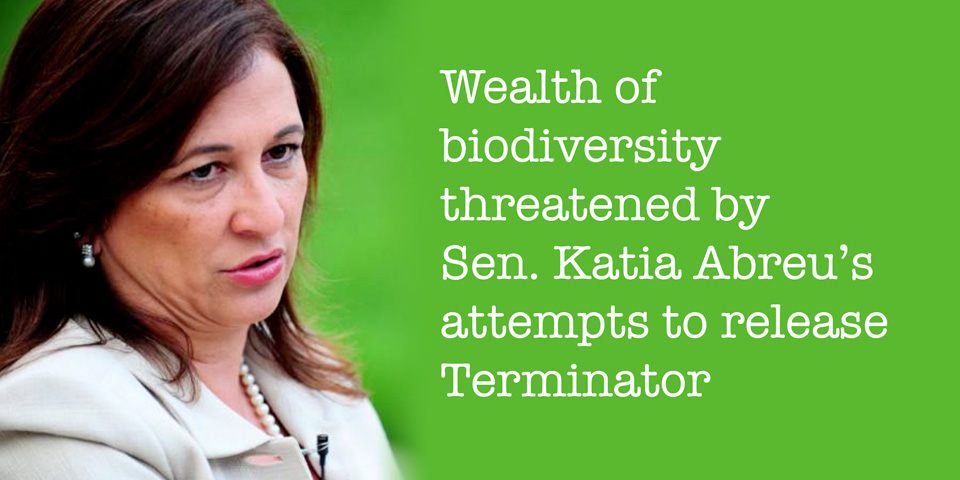
Senator Katia Abreu’s attempt to allow sterile GM seeds threatens the genetic resources of Brazil and ultimately the world, writes Prof Nagib Nassar
In an interview in the Sunday edition of the Brazilian daily Journal Folha do Sao Paulo (4 May 2015), the president of the government-owned agricultural research company Embrapa stressed the company’s intention to invest in open source genetics in order to increase the availability of new seeds to farmers. In other words, the company will sell seeds to farmers without collecting royalties.
This commendable plan on the part of the President could contribute to the improvement of the conditions of farmers in Brazil. But unfortunately, he completely contradicted his own boss, the Minister of Agriculture, Senator Katia Abreu, who presented to the National Congress a bill to release types of seeds that are banned worldwide. These are the so-called Terminator or suicide seeds – sterile seeds that do not produce viable seeds, forcing farmers to buy new seed every year. In this way, the farmers become slave of the multinational corporations that produce seed.
In 2000, governments at the United Nations Convention on Biological Diversity created a moratorium on Terminator (GURTS or Genetic Use Restriction Technologies) and recommended that governments not approve field testing or commercial use of Terminator.
Scientists fear that the Terminator genes engineered into the seed could leak out, causing other species to become sterile. This could destroy other crops and wild plant populations, leaving only the GM variety with the Terminator gene.
Abreu’s action raised the question of to what extent she considers herself above the decision taken by governments worldwide.
Terminator represents the latest bid of GMO seed companies to provide more profit and wealth for their shareholders without respecting the public interest and future generations.
The most serious fact is that companies are pushing some countries and manipulating politicians to approve this type of patent and allow its commercialization.
Some of the most important Brazilian crops such as corn and cotton have a high rate of outcrossing (allogamous), meaning that they can cross-pollinate easily with other plants of different varieties – Terminator crops included. Native varieties of corn and cotton abound in Brazil and represent a great wealth of biodiversity that would be threatened by the release of Terminator seeds. The introduction of Terminator varieties of these crops could lead to contamination of the native strains, making them sterile and unable to reproduce. We would lose forever one of the largest gene pools in the world.
Any release of Terminator seeds in Brazil would mean that the country would break a moratorium signed by 193 governments, injuring its relationship with the world community.
We believe that the Brazilian people can stop this aggressive attack on our heritage and humanity’s patrimony. We must put an end to the attempts by some government leaders to forge a new agricultural scenario that will result in losing our genetic wealth forever.
Ironically, Terminator seeds are produced by companies as a way for them to sell supposedly ’genetically contained’ GM seeds without having to consider the potential destruction of Brazilian genetic heritage and the replacement of native varieties with GM Terminator varieties. But Terminator genes may not be 100% contained and could eventually lead to a situation in which all seeds are patented and owned by multinational companies. If the Brazilian government allows the release of Terminator seeds, this will be the crack in the door that will allow GMO seed companies to take over the whole house. Does Katia Abreu realise the implications of what she is doing?
Nagib Nassar is Emeritus Professor at the University of Brasilia (UNB). www.geneconserve.pro.br










